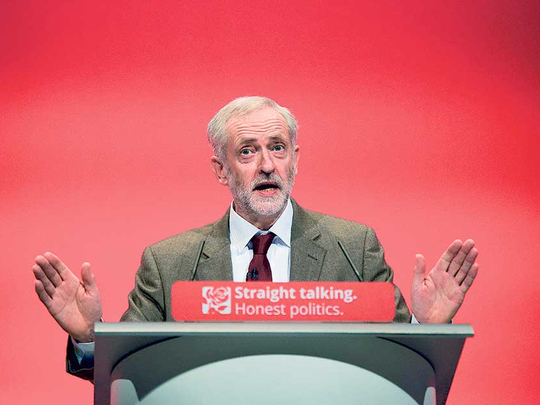
Brighton, United Kingdom: Lionised by the grassroots but at odds with his own MPs, Labour leader Jeremy Corbyn leaves his first party conference facing deep divisions as he tries to convince Britain he is not too radical to be prime minister.
After wining the leadership last month thanks to rank-and-file members, the left-winger wanted to use the conference to spread his message to the public but faced clashes with sceptical MPs on issues including nuclear weapons and Syria.
“He tried to use this conference as a way of reassuring the world outside that he’s not dangerous,” said Eunice Goes, associate professor of politics at Richmond University, who is writing a book on his predecessor, Ed Miliband.
Ahead of the conference, the Conservative Party of Prime Minister David Cameron described Corbyn as a “threat to our national security”.
Corbyn avoided a potentially damaging vote on the future of Britain’s nuclear defence deterrent Trident - to which he is opposed - although deep divisions on the hot-button issue flared up on Wednesday.
The newly-elected leader insisted he would not use nuclear weapons if he became prime minister, adding that they “didn’t do the USA much good on 9/11”.
His own shadow foreign minister Hilary Benn said “any prime minister has to have the option” of using the nuclear deterrent, while the party’s top official for defence, Maria Eagle, said the comment was not helpful.
Corbyn said he would try to resolve such divisions by persuasion, promising to introduce a “new type of politics” that would involve consensual policy making.
“You can see that this is someone with no experience in power and he is realising that he needs to take firm positions,” said Iain Begg, a professor at the London School of Economics.
“He is going through a kind of very quick initiation... It didn’t go too badly with people in the hall and party members,” he said. “It’s with MPs that he has difficulties.”
Another bone of contention is whether Labour should support Britain joining air strikes against Daesh targets in Syria.
Cameron could put the issue to a vote in parliament within weeks and Corbyn is opposed to the move, while some other leading Labour figures are in favour.
The conference passed a compromise motion on Wednesday saying Labour MPs taking part in an expected vote in parliament should only back air strikes if there is United Nations authorisation.
The motion was passed by a near-unanimous show of hands but rifts on the issue are likely to resurface.
Corbyn’s speech and its call for a firmer anti-austerity stance was mostly well-received at the conference, although it lacked firm policy announcements and was panned by many political commentators.
But Peter Mandelson, an architect of the 1990s “New Labour” project to make the party more centrist which is hated by the “Corbynites”, admitted there was little chance of him being deposed soon.
“Nobody will replace him... until he demonstrates to the party his unelectability at the polls,” he said.
Most of the sniping at the conference came from allies of centrist former leader Tony Blair on the sidelines.
Corbyn is a little-known quantity with the British public, and his ability to appeal to swing voters is a key question after the electorate awarded the centre-right Conservative party a majority in May.
His conference speech, a rare opportunity for opposition leaders to reach wide audiences, was ridiculed in the British press.
Britain’s biggest-selling daily The Sun, which endorsed the Conservatives in the election, called Corbyn’s speech “incoherent, dishonest, irrelevant, pitiful drivel... the disjointed ramblings of a dreary career protester”.
“He won a hearing, not the argument,” wrote the left-leaning Guardian in an editorial. “This was not a speech aimed beyond the Labour tent.”
Headlines also mocked Corbyn for using material crafted by a speechwriter in the 1980s, and his choice of a red tie and brown jacket drew unflattering comparisons to comedy character Mr Bean.
Labour MP Keir Starmer later told a fringe event that Corbyn represented a “yearning” for a radical shift of politics, and joked he was “not the Messiah”.
For his supporters, Corbyn has already performed miracles by giving Labour a left-wing impetus that receded during the centrist Blair years.
But he may need more to keep his party in check and convert a doubting public.












